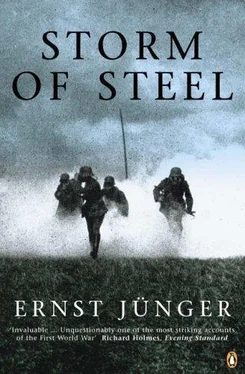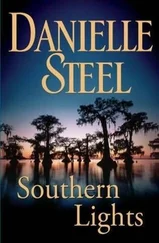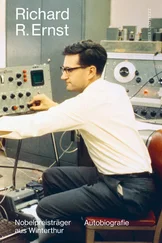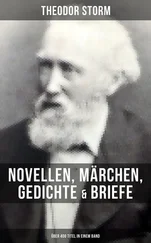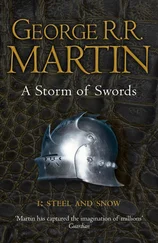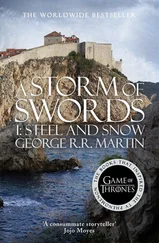We had come from lecture halls, school desks and factory workbenches, and over the brief weeks of training, we had bonded together into one large and enthusiastic group. Grown up in an age of security, we shared a yearning for danger, for the experience of the extraordinary. We were enraptured by war. We had set out in a rain of flowers, in a drunken atmosphere of blood and roses. Surely the war had to supply us with what we wanted; the great, the overwhelming, the hallowed experience. We thought of it as manly, as action, a merry duelling party on flowered, blood-bedewed meadows. ‘No finer death in all the world than…’ anything to participate, not to have to stay at home!
‘Form up by platoon!’ Our heated fantasies cooled down on the march through the claggy soil of Champagne. Knapsacks, munition belts and rifles hung round our necks like lead weights. ‘Ease up! Keep up at the back!’
Finally we reached Orainville, one of the typical hamlets of the region, and the designated base for the 73rd Rifles, a group of fifty brick and limestone houses, grouped round a chateau in parkland.
Used as we were to the order of cities, the higgledy-piggledy life on the village streets struck us as exotic. We saw only a few, ragged, shy civilians; everywhere else soldiers in worn and tattered tunics, with faces weather-beaten and often with a heavy growth of beard, strolling along at a slow pace, or standing in little clusters in doorways, watching our arrival with ribald remarks. In a gateway there was a glowing field kitchen, smelling of pea soup, surrounded by men jingling their mess-tins as they waited to eat. It seemed that, if anything, life was a little slower and duller here, an impression strengthened by the evidence of dilapidation in the village.
We spent our first night in a vast barn, and in the morning were paraded before the regimental adjutant, First Lieutenant von Brixen, in the courtyard of the chateau. I was assigned to the 9th Company.
Our first day of war was not to pass without making a decisive impression upon us. We were sitting over breakfast in the school where we were quartered. Suddenly there was a series of dull concussions, and all the soldiers rushed out of the houses towards the entrance of the village. We followed suit, not really knowing why. Again, there was a curious fluttering and whooshing sound over our heads, followed by a sudden, violent explosion. I was amazed at the way the men around me seemed to cower while running at full pelt, as though under some frightful threat. The whole thing struck me as faintly ridiculous, in the way of seeing people doing things one doesn’t properly understand.
Immediately afterwards, groups of dark figures emerged on to the empty village street, carrying black bundles on canvas stretchers or fireman’s lifts of their folded hands. I
stared, with a queasy feeling of unreality, at a blood-spattered form with a strangely contorted leg hanging loosely down, wailing ‘Help! Help!’ as if sudden death still had him by the throat. He was carried into a building with a Red Cross flag draped over the doorway.
What was that about? War had shown its claws, and stripped off its mask of cosiness. It was all so strange, so impersonal. We had barely begun to think about the enemy, that mysterious, treacherous being somewhere. This event, so far beyond anything we had experienced, made such a powerful impression on us that it was difficult to understand what had happened. It was like a ghostly manifestation in broad daylight.
A shell had burst high up over the chateau entrance, and had hurled a cloud of stone and debris into the gateway, just as the occupants, alerted by the first shots, were rushing out. There were thirteen fatalities, including Gebhard the music master, whom I remembered well from the promenade concerts in Hanover. A tethered horse had had a keener sense of the approaching danger than the men, and had broken free a few seconds before, and galloped into the courtyard, where it remained unhurt.
Even though the shelling could recommence at any moment, I felt irresistibly drawn to the site of the calamity. Next to the spot where the shell had hit dangled a little sign where some wag had written ‘Ordnance this way’. The castle was clearly felt to be a dangerous place. The road was reddened with pools of gore; riddled helmets and sword belts lay around. The heavy iron chateau gate was shredded and pierced by the impact of the explosive; the kerbstone was spattered with blood. My eyes were drawn to the place as if by a magnet; and a profound change went through me.
Talking to my comrades, I saw that the incident had rather blunted their enthusiasm for war. That it had also had an effect on me was instanced by numerous auditory hallucinations, so that I would mistake the trundling of a passing cart, say, for the ominous whirring of the deadly shell.
This was something that was to accompany us all through the war, that habit of jumping at any sudden and unexpected noise. Whether it was a train clattering past, a book falling to the floor, or a shout in the night – on each occasion, the heart would stop with a sense of mortal dread. It bore out the fact that for four years we lived in the shadow of death. The experience hit so hard in that dark country beyond consciousness, that every time there was a break with the usual, the porter Death would leap to the gates with hand upraised, like the figure above the dial on certain clock towers, who appears at the striking of the hour, with scythe and hourglass.
The evening of that same day brought the long-awaited moment of our moving, with full pack, up to battle stations. The road took us through the ruins of the village of Betricourt, looming spectrally out of the half-dark, to the so-called ‘Pheasantry’, an isolated forester’s house, buried in some pine woods, where the regimental reserve was housed, of which, to this point, the 9th Company had formed a part. Their commander was Lieutenant Brahms.
We were welcomed, divided up into platoons, and before long found ourselves in the society of bearded, mud-daubed fellows, who greeted us with a kind of ironic benevolence. They asked us how things were back in Hanover, and whether the war might not be over soon. Then the conversation turned, with us all listening avidly, to short statements about earthworks, field kitchens, stretches of trench, shell bombardment, and other aspects of stationary warfare.
After a little while, a shout rang out in front of our cottage-like billet to ‘Turn out!’ We formed up into our platoons, and on the order ‘Load and safety!’ we felt a little twinge of arousal as we rammed clips of live ammunition into our magazines.
Then silent progress, in Indian file, through the landscape dobbed with dark patches of forest to the front. Isolated shots rang out from time to time, or a rocket flared up with a hiss to leave us in deeper darkness following its short spectral flash. Monotonous clink of rifles and field shovels, punctuated by the warning cry: ‘Watch it, barbed wire!’
Then a sudden jingling crash and a man swearing: ‘Dammit, why couldn’t you tell me there’s a crater!’ A corporal shuts him up: ‘Pipe down, for Christ’s sake, do you think the French are wearing earplugs?’ More rapid progress. The uncertain night, the flickering of flares and the slow crackling of rifle fire produce a kind of subdued excitement that keeps us strangely on our toes. From time to time, a stray bullet whines past chilly into the distance. How often since that first time I’ve gone up the line through dead scenery in that strange mood of melancholy exaltation!
At last we dropped into one of the communication trenches that wound their way through the night like white snakes to the front. There I found myself standing between a couple of traverses, lonely and shivering, staring hard into a line of pines in front of the trench, where my imagination conjured up all sorts of shadowy figures, while the occasional stray bullet slapped into the boughs and somersaulted down with a whistle. The only diversion in this seemingly endless time was being collected by an older comrade, and trotting off together down a long, narrow passage to an advance sentry post, where, once again, it was our job to gaze out into the terrain in front. I was given a couple of hours to try to find an exhausted sleep in a bare chalk dugout. When the sky lightened, I was pale and clay-daubed, and so was everyone else; I felt I had lived this sort of mole’s life for many months already.
Читать дальше
